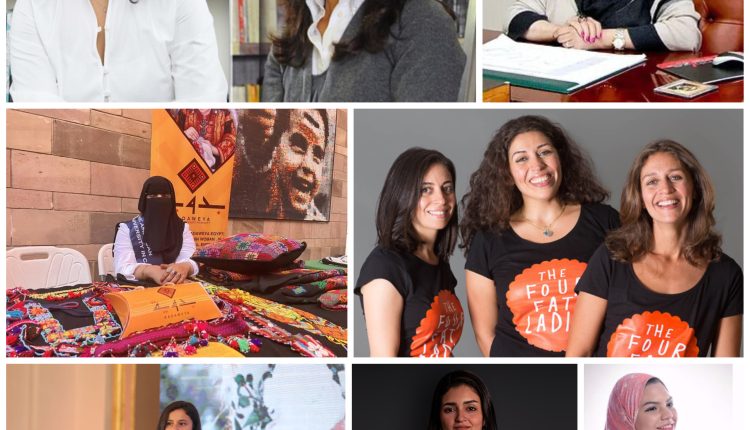From scientists to athletes, doctors, CEOs, pilots, and authors, women in Egypt have been combating challenges and stereotypes so they won’t define them anymore. We believe that women should be celebrated every day, not only during International Women’s Day, and this year, we’re honouring the amazing and inspiring females who are making their own way.
Egypt has no lack of outstanding females who are all worth being dubbed inspirational in so many ways. So in honour on International Women’s Day and in this article, we will shed a light on some inspirational female entrepreneurs who run Egyptian startups that will motivate you.
Manal Amin
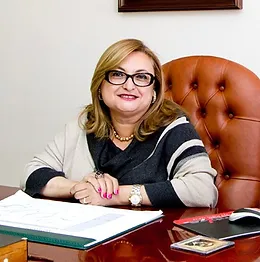
Manal Amin is a pioneer in the field of language technology in Egypt, she founded Arabize, an Egyptian translation and localisation provider, in 1994, to meet the need for high standard professional Arabic localization services.
Arabize has become a leading content provider in the Middle East, offering top quality services; localization, translation, transcreation, content development and management, testing, digitization and desktop publishing.
Arabize has provided almost 250 worldwide clients with their services, working on over 1400 projects yearly.
Amin has also established the first localization and content training center in Egypt, and mentored many generations of localizer and technical writers.
Amin holds a BA in Political Science and a Diploma in Translation, has won the African Information and Communication Technical Champion award in 2013, and was ranked 77th among the 200 Most Powerful Women in the Middle East by Forbes in 2014.
Amin is currently on the Advisory Board of the School of Continuing Education at the AUC, and serves on the Globalization and Localization Association board of directors.
Hind and Nadia Wassef

The Wassef sisters founded Diwan, one of the top bookstores in Cairo, in 2002, with the bookstore’s first branch opening in Zamalek, then expanding across Egypt later on. Diwan’s first 10 branches opened in a span of 10 years, then the business grew, even paving the way for new bookstores to open in Egypt and provide readers with a comfortable place to read and browse for books.
The sisters aspired to bring together eastern and western cultures and aesthetics, and spread the Arab culture through their boutique bookstore.
The Wassef sisters participated in Endeavor Egypt, a global program in 2009 that provided mentoring and support for selected rising entrepreneurs.
Shadw Helal
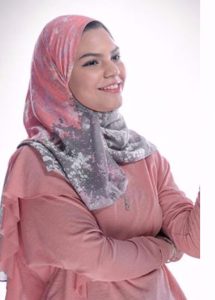
Shadw Helal is the creator of the Rescue app, a security mobile app that is a way to face one of Egypt’s most important social issues; sexual harassment. The app works through voice commands or a software button, to help both male and female users across Cairo, and sends calls to volunteers in different areas to rescue the call sender.
The app was launched in 2017, when Helal was only a 21-year old medicine student, after a traumatic incident a friend of hers had experienced.
The app has won several competitions like the Orange Startup Cup and the IEEE app development competition.
Helal has expressed her goal to extend activities by introducing self-defense lessons for women and awareness campaigns.
Faten Ghonem
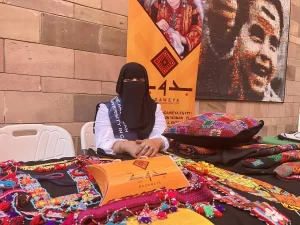 Faten Ghonem, who graduated with a degree in Science from Suez Canal University, was the first from her village in Rafah, Shabana, to pursue a higher education. Ghonem wanted to become a teaching assistant, but her father did not approve, as her tribe would not have been accepting. People in Ghonem’s village had to flee Rafah during ISIS terrorist attacks in the region. As they worried about their handcraft and clothes making-heritage to be lost, and women needing a source of income to adapt to the new life outside of Sinai, Faten came up with the idea of her business.
Faten Ghonem, who graduated with a degree in Science from Suez Canal University, was the first from her village in Rafah, Shabana, to pursue a higher education. Ghonem wanted to become a teaching assistant, but her father did not approve, as her tribe would not have been accepting. People in Ghonem’s village had to flee Rafah during ISIS terrorist attacks in the region. As they worried about their handcraft and clothes making-heritage to be lost, and women needing a source of income to adapt to the new life outside of Sinai, Faten came up with the idea of her business.
Ghonem started Badaweya in 2016, with EGP 1 million worth of personal investments, alongside six other women leading the groups, she sends the designs and orders, while they contacted more than 200 women to start working on the handmade products.
Accessories represent about 70 percent of Badaweya’s sold products, with demand on earrings, pendants, belts and bracelets being very high, which is helpful to the women hand making them, as they require low efforts, and the women can produce a big amounts of them.
“We cannot make identical products, despite the design being the same, as the women use what is available to them, which happen to be different in colours, and that causes a 30 percent loss, as I have distributors ordering 100 identical pieces and that is not possible,” said Ghonem.
Faten participated in the AUC’s She Can Scholarship for women empowerment, to gain more knowledge that can help her improve her business. She has recently learned that she was targeting the wrong customers before in Europe, but discovered that her ideal customers are Jordanian and Palestinian women, who really like her products.
“I am currently aiming to only have an online shop, our website will be ready by late 2020, and our app will be launched two years later, we expect to sell EGP 10,000 worth of products per day, and for that number to increase to 50,000 in five years,” said Ghonem.
Aya Mounir
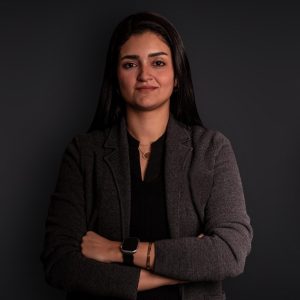
Aya Mounir started her startup, Seafood Factory, the first app selling all types of seafood products in Egypt; fresh out of the sea, cleaned, marinated or even ready to eat. The idea of Mounir’s startup came from seeing seafood products neglected in markets and major stores. The unlikeable smell we hate in the seafood section in supermarkets is actually a sign of the products starting to rot, and that is why Seafood Factory makes sure to deliver their orders with its “sea smell”.
Seafood Factory works on delivering seafood orders to customers within a day from being fished out of the Red Sea, or freezing the fish the same day it is fished cleaning and packaging them in their New Cairo factory. The packaged products then are sent to their six distribution centers in Cairo and Alexandria and delivered to customers on the same day. The process has to be done as fast as possible, considering Egypt’s hot weather, so the products do not go bad.
“We launched our business with personal investments worth EGP10 million, and we still have not entered any funding rounds, I am here to learn more about negotiations and entering a funding round,” said Mounir.
Seafood Factory sells around 10,000 products per month, and was successful to get three percent of the Egyptian seafood market share, aiming to increase the percentage to 12 percent in three years.
Nadine Farrag
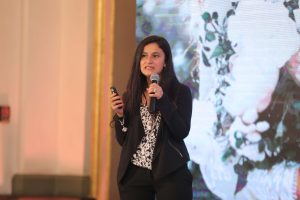
Nadine Farrag graduated with two Bachelor’s degrees in Marketing and Journalism with highest honours from the AUC in 2012, and was very interested in traveling and exploring the world, that later gave her the idea for her wedding planning business, Farahy.
Farrag’s business planning started in 2017, but was officially launched in 2020, the idea came to her after seeing how messy and difficult wedding planning can be, especially when she witnessed it firsthand while helping her friends plan their weddings.
Farrag co-founded Farahy with personal investments of EGP 25, 000, and since its launch three years ago, has planned 300 weddings.
Customers can pick and choose every wedding detail during the planning process; from the photography, lighting, decorations to the cars, and they can do that through their website. Customers can also pay the fees in installments through consumer finance apps like Valu and Contact.
Farahy’s wedding planning is responsible for everything, from booking the wedding hall and its preparations, to planning the couples’ honeymoon trips, they even plan wedding proposals.
“We are working on entering a funding round to get $200,000 worth of investments, which will help us launch an app for Farahy, the She Can program helped us know more about the right time to enter a funding round, and we hope in the next five years to plan weddings in Gulf countries or North Africa,” said Mounir.
Sara Hegazy
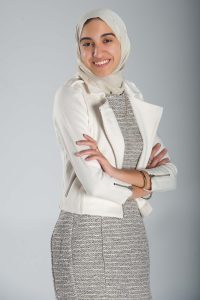
Sara Hegazy is an engineer, who got into the fashion designing industry, is one of the most prominent names in her field. Hegazy first started fashion designing by designing gowns to her friends, after learning to design through online courses, then later turned it into a career after participating in a Maybelline New York competition, where she realized her talent.
Hegazy founded her own international fashion brand in 2010 in Dubai, and became the first Egyptian couture brand to showcase at the London Fashion Week catwalk in 2013. Hegazy’s brand also had its Cleopatra collection, with crystals from Asfour, be featured at the Tiffany Fashion Show and Paris Fashion Week in 2014.
Hegazy designs custom made evening and wedding gowns that have rich colors and plenty of embroidery, her brand emphasizes luxury, uniqueness and a trend setting aspect.
Nira, Heba and Sherine Shunbo
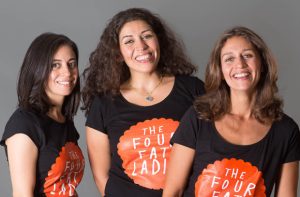
The Shunbo sisters started their Four Fat Ladies business in 2012 in an apartment, with their family recipes and a passion for baking, they had a fourth partner initially, but now they say the fourth lady is their mother.
Four Fat Ladies specialise in classic American desserts, their most popular products being the salted caramel fudge brownies, and before that their famous cheesecake.
The three sisters had different careers prior to their business, Nira worked in public relations, Heba worked in interior design and Sherine worked in architecture.
Four Fat Ladies had a collaboration with TBS in 2015, and both businesses were purchased by Egypt’s Intro, run by the Abbas family.


